KOTA KINABALU: A partnership with the communities of Kg Lapasan Ulu and Kg Tinuhan in Tuaran district, is revitalising paddy production on …
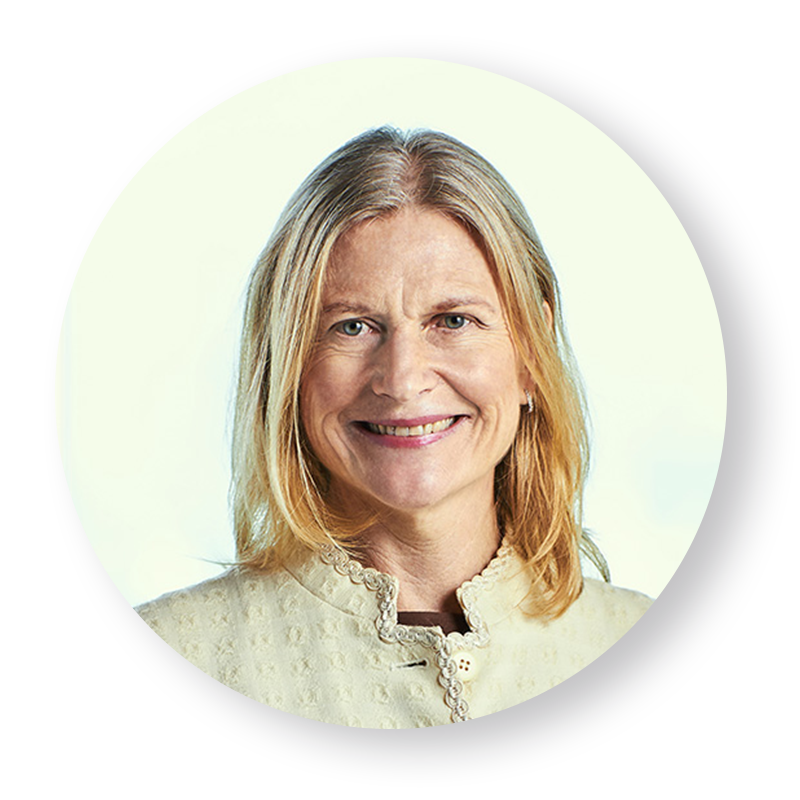
" Covid has impacted the lives of millions around the globe—and in Malaysia—requiring an immediate and targeted response to help the communities most affected. Yayasan Hasanah has played an important role in partnership with government and NGOs and has shifted its work expeditiously and effectively, getting close to the ground, to help those in need. Clearly there is still much to be done and the devastating effect of the pandemic is still reverberating. "
2020 was a year of great paradox, to say the least. On the one hand, we were faced with unprecedented trials and tribulations, while on the other, it was pretty much business as usual. Here’s a summary of the year as portrayed by the media and the press.
Speaking
Engagements
Media
Clippings
Audience
Reached
Social Media Post
Across 3 Platforms
Audience
Reached
Engagements
Hasanah has been actively
positioning itself as being on
the forefront, providing
grants for COVID 19 relief.
On social media, Hasanah is
running a campaign to build
online engagement using The
Hasanah Report 2019
29 April – 02 July 2020 :
52 media coverage in total
Total PR Value
KOTA KINABALU: A partnership with the communities of Kg Lapasan Ulu and Kg Tinuhan in Tuaran district, is revitalising paddy production on …
KUALA LUMPUR: Bekas atlet olahraga negara yang menjadi mangsa banjir kilat di Kajang, Sabtu lalu, S Silvadurai menerima sumbangan Skim Bantuan Khas …
THE Covid-19 pandemic and movement control order (MCO) have taught Sujiyanti Narun the importance of adaptability to survive and to tap into …
KUALA LUMPUR, April 28 — The Government-Linked Companies (GLC) and Government-Linked Investment Companies (GLIC) Disaster Response Network (GDRN) has received RM95.4 million contributions from …
KUALA LUMPUR: Yayasan di bawah Khazanah Nasional Bhd, Yayasan Hasanah meluluskan dan mengagihkan 19 projek bernilai RM3.6 juta di bawah Geran Khas …
AS MENTIONED BY YAYASAN HASANAH IN THE LATEST STATEMENT, YAYASAN HASANAH : EMPOWER AND PARTNER WITH CIVIL SOCIETY ORGANISATIONS AND IMPACT THE …
Throughout the year, the Hasanah team spoke at various forums and on numerous topics with the aim of encouraging public discourse and knowledge sharing as well as promoting thought leadership in the sector.
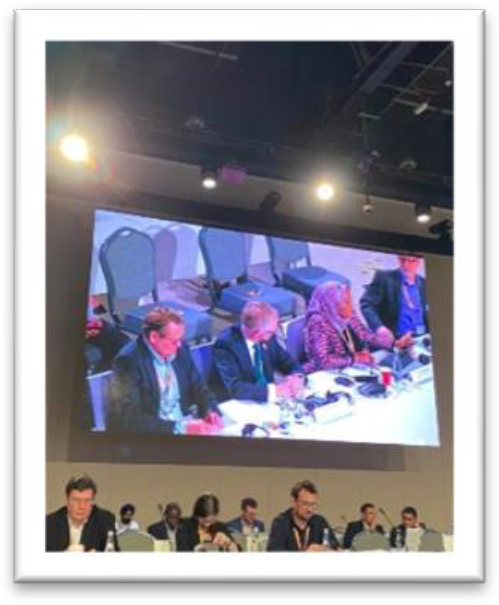
Foundations & Philanthropists Roundtable at the World Urban Forum (WUF10) on 10 Feb 2020
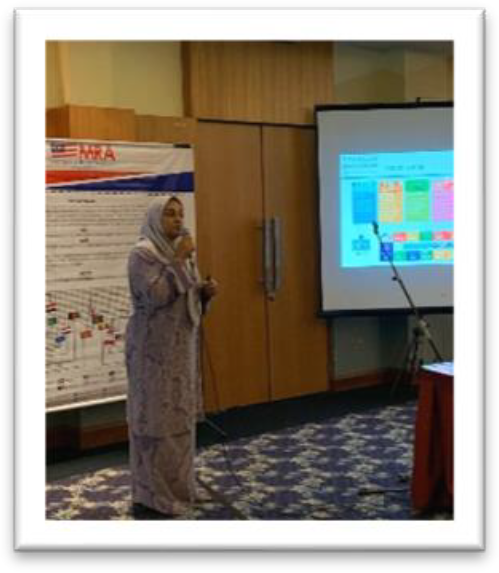
Menuju Kelestarian Kewangan at Konvensyen Kebangsaan MRA 2020 on 15 Feb 2020
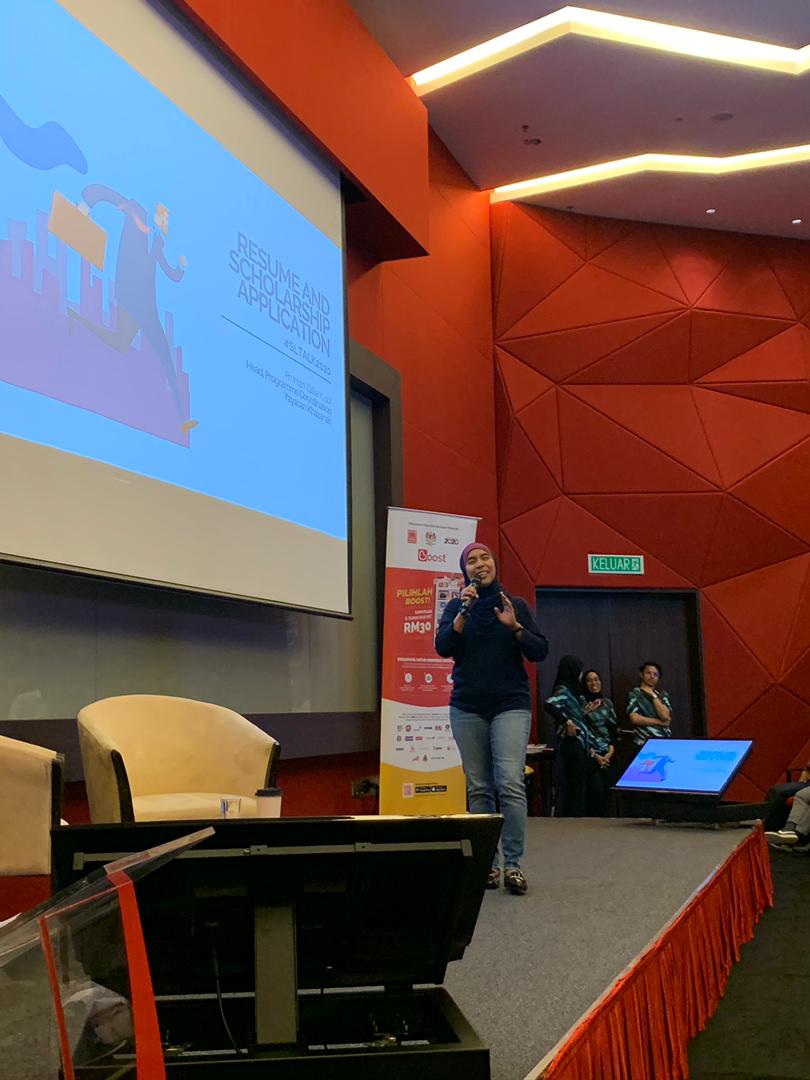
#SLTalk2020 education seminar organised by Schoollah Malaysia in collaboration with Boost, Celcom and Yayasan Khazanah Education Pathways: Scholarship Opportunities Date: 13 Feb 2020, Axiata Auditorium
Motivation Camp for B40 students, UKM organised by HumanCapient and Yayasan Khazanah Life after SPM Date : 4 Mar 2020
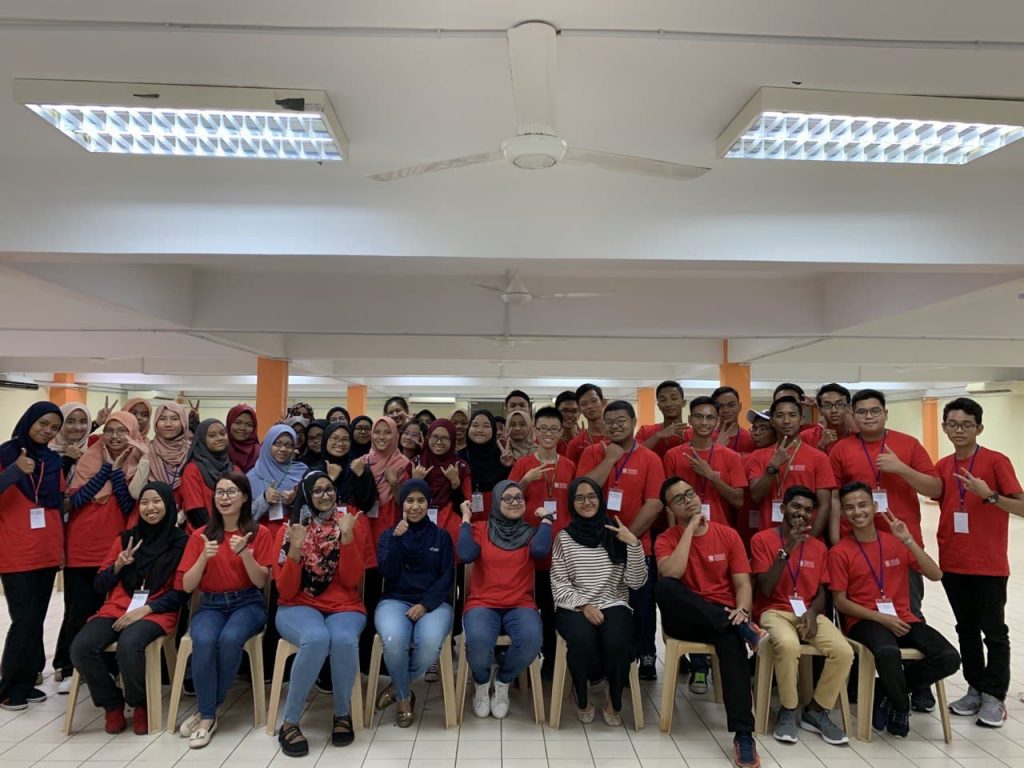
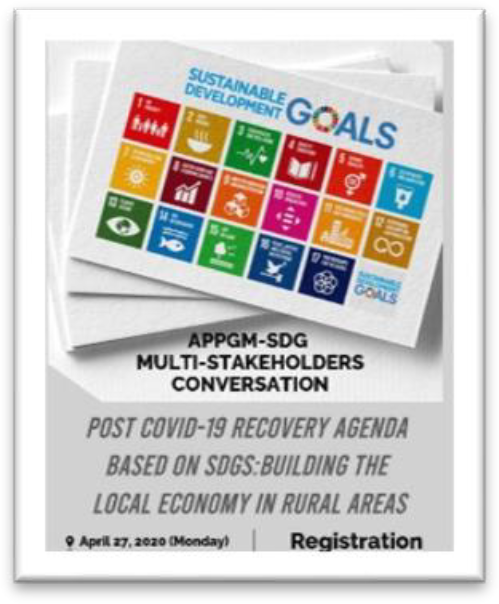
Post Covid 19 Recovery Agenda Based on SDGs; Builing the Local Economy in Rural Areas at APPGM at APPGM SDG Multi Stakeholders Conversation on 27 April 2020
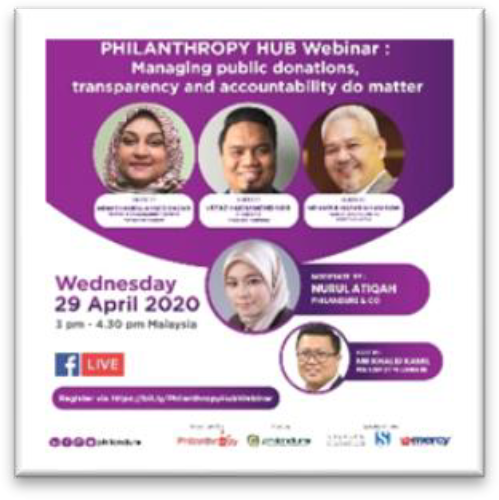
Managing Public Donations, Tranparency and Accountability do Matter at Philanthropy Hub Webinar on 29 April 2020
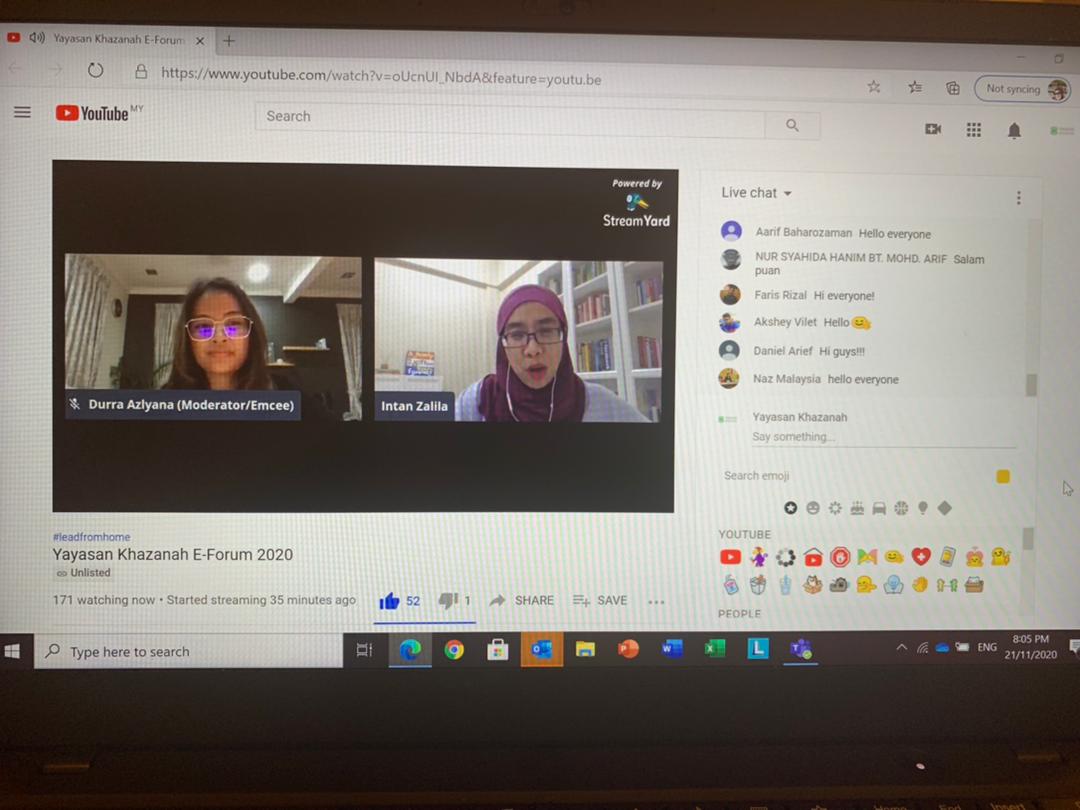
ERE Web Forum 2020 #3 – Environment Malaysia 2050 Battling the Challenges for the coming Decade – Terrestrial and Marine Ecosystem Date : 24 April 2020
EY Government & Public Sector Covid 19 Virtual Roundtable hosted by EY Global on 14 May 2020
Malaysia Responds to Covid 19 at Asian Philanthropy Circle Online Dialogue on 28 May 2020
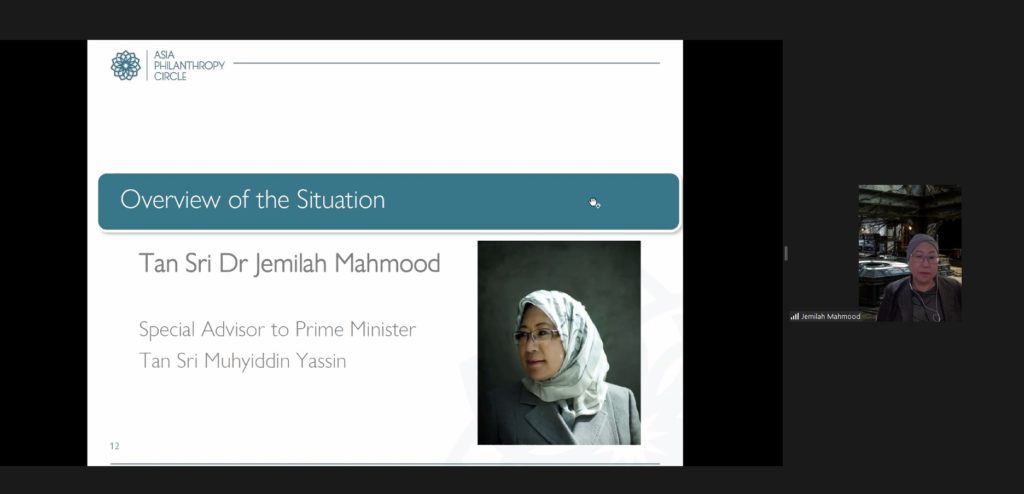

Webinar Biodiversiti Kebangsaan – Dasar Kepelbagaian biologi kebangsaan: Cabaran dan Hala Tuju Date: 21 May 2020
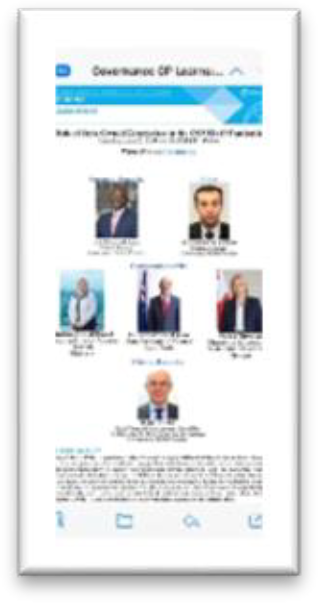
BBL: Role of State Owned Enterprises in Addressing the Covid 19 Pandemic hosted by World Bank on 2 June 2020

Role of Hasanah in Nation Building By Astro Awani on 5 June 2020
Community Reliance and Response efforts in Handling COVID19 Workshop - Development of Human Resources for Rural Areas(DHRRA), Malaysia Date: 28 July 2020
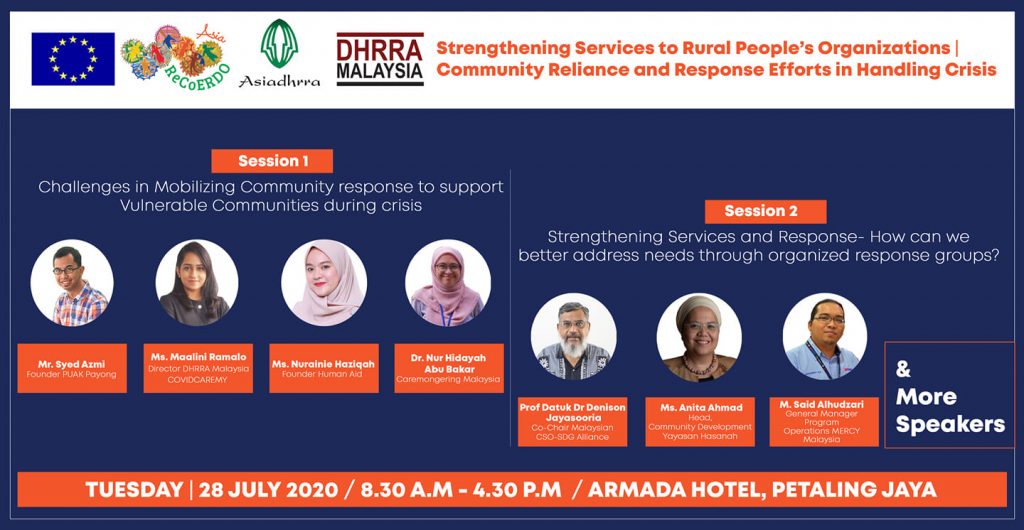
CIMB’s Cooler Earth summit launch Wek-end ; Interview on ArtsFAS (Arts For All seasons)
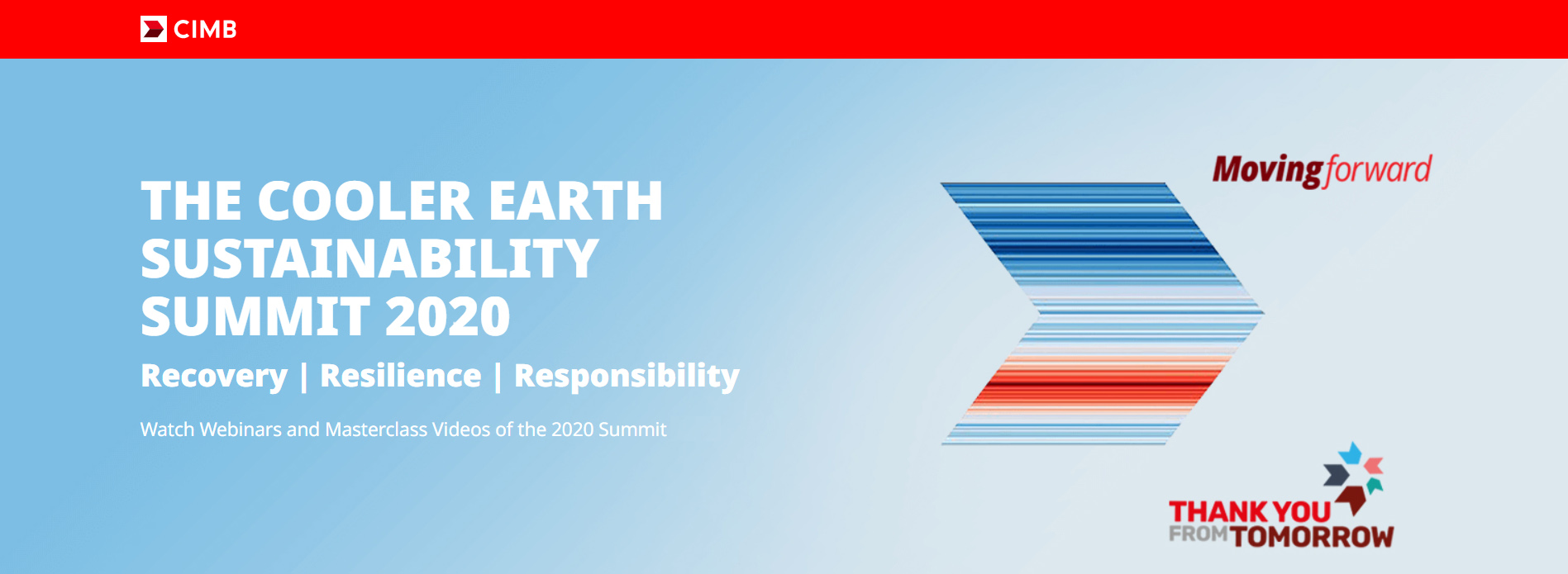
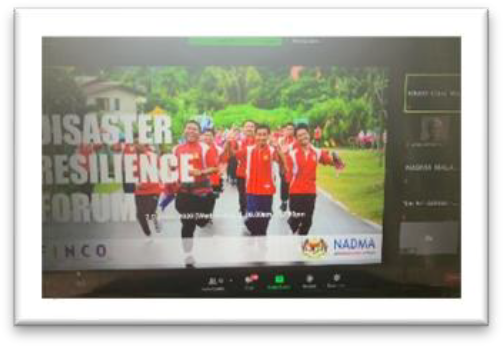
Disaster Resilience Forum organised by Financial Industry Collective Outreach (FINCO) and Agensi Pengurusan Bencana Negara (NADMA) on 7 Oct 2020.
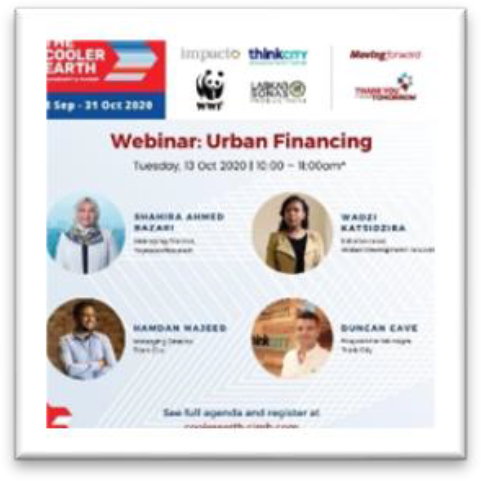
Webinar: Urban Financing organised by CIMB (The Cooler Earth Sustainability Summit) on 13 Oct 2020.
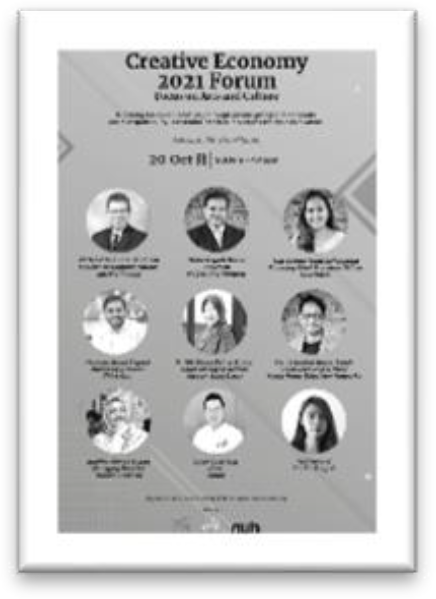
Creative Economy 2021 Forum (Focus on Arts & Culture) hosted by CENDANA on 20 Oct 2020.
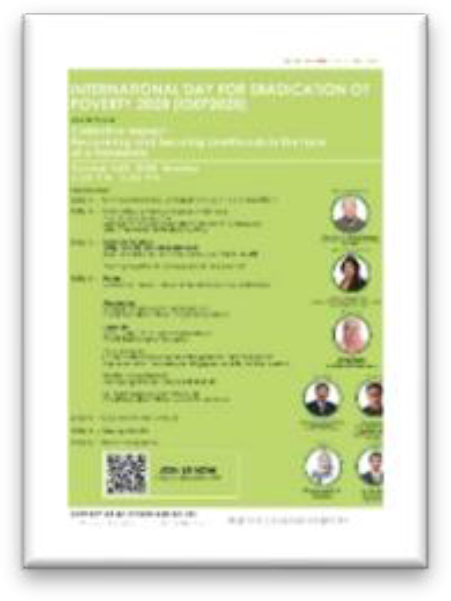
Collective Impact: Recovering and securing livelihoods in the face of a pandemic organised organised by Yayasan Sejahtera in conjunction with International Day for Eradication of Poverty 2020 on 26 Oct 2020.
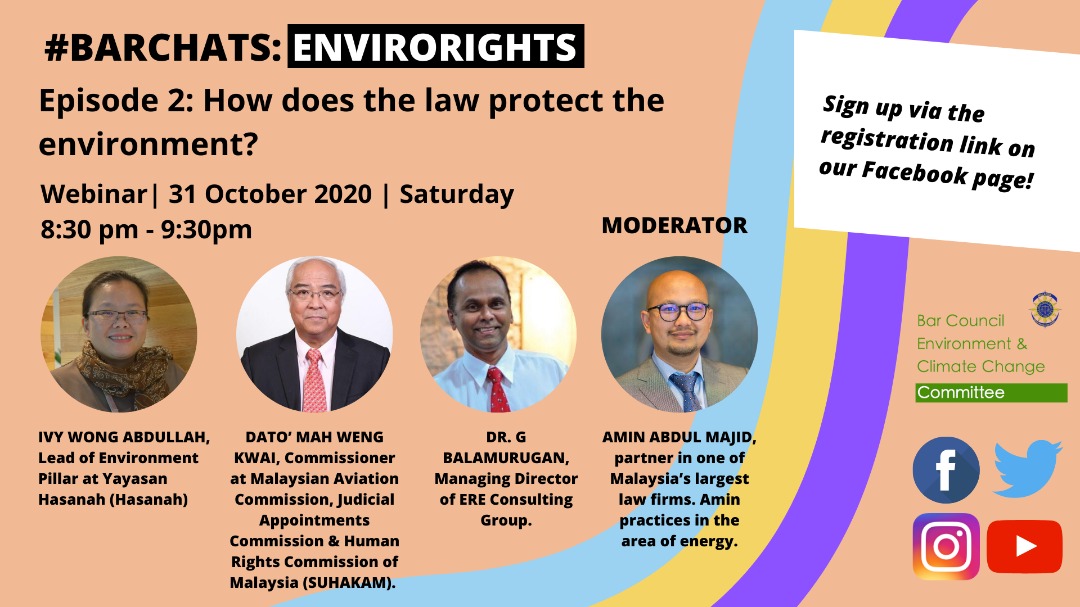
Bar Council EnviroChats – Series#2 – How does the law protect the environment? Date: 31 Oct 2020
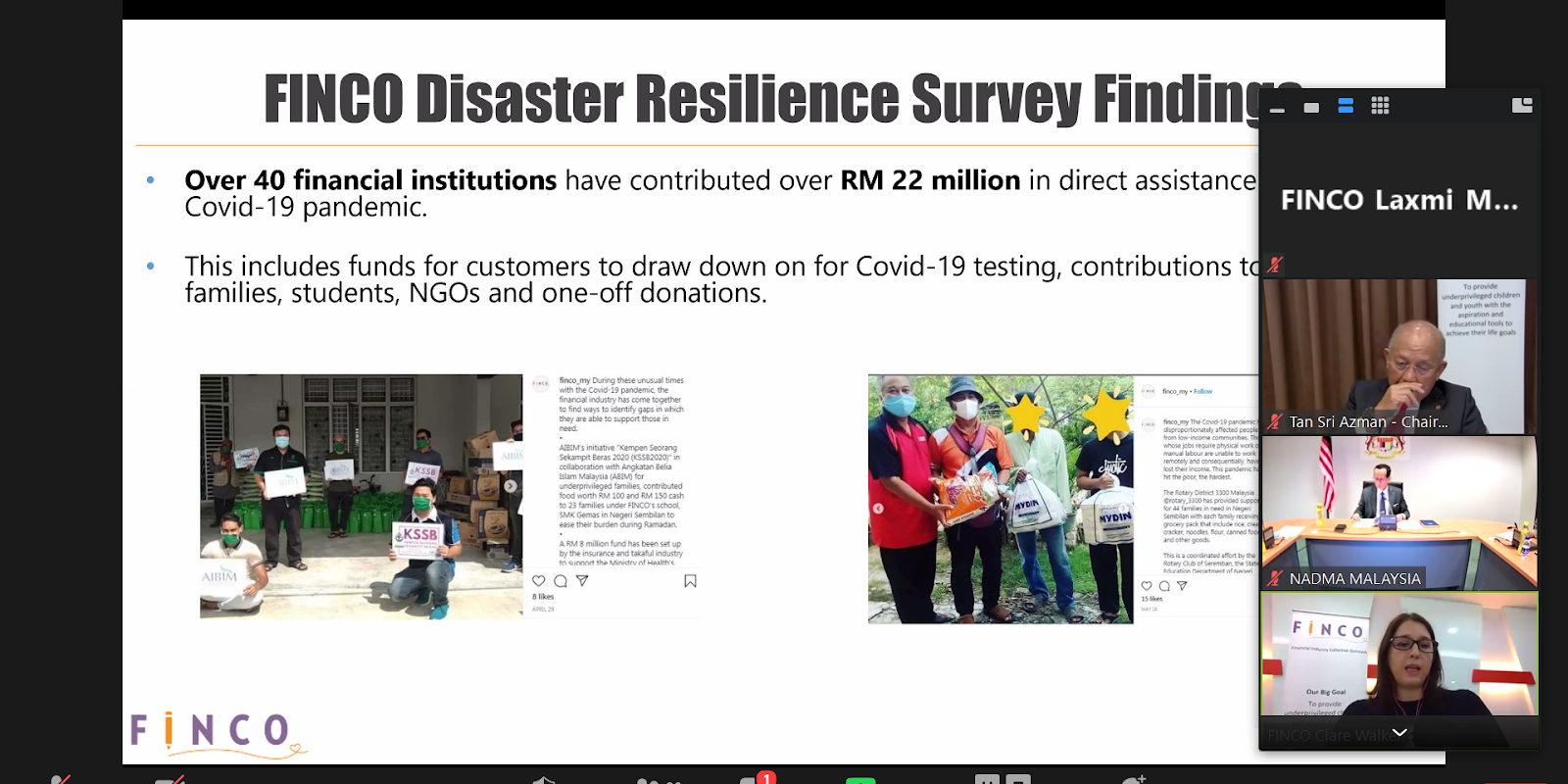
Financial Industry Collective Outreach (FINCO) Online Disaster Resilience Forum on “Lessons Learnt on Effective Collaboration Through The GLC/GLIC Disaster Response Network” Date: 31 Oct 2020
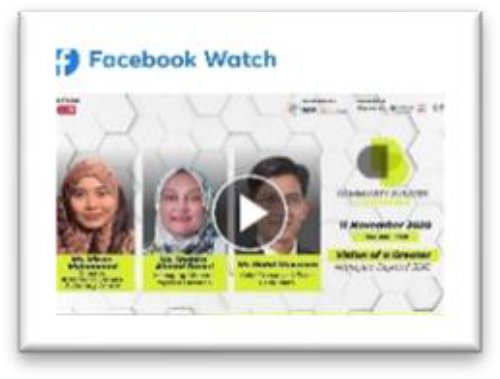
Vision of Greater Malaysia Beyond SDG at at GLOBS2020 on 11 Nov 2020.
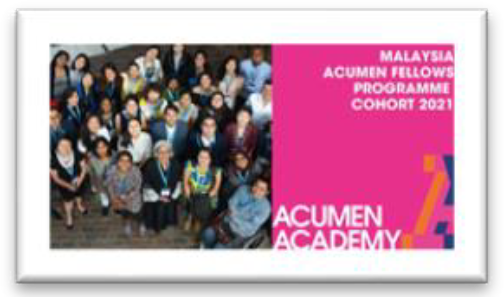
Acumen Fellows Program Selection Panelist on 21 & 22 Nov 2020.
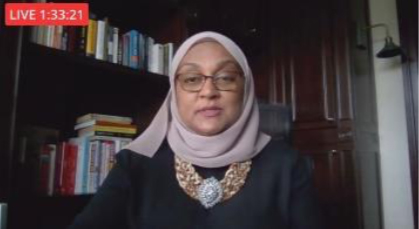
Launch of artefacts documented in Galeria Perdana Langkawi hosted virtually by Yayasan Wiba Prima on 30 Nov 2020

E-Forum 2020 COVID-19: Blessing in Disguise for the Environment? And #LeadFromHome: Student Leadership and the Pandemic (virtual FB live). Date: 21 Nov 2020
RASMA 2020 Graduation at The Roots & Shoot Malaysia Award Graduation Ceremony on 5 Dec 2020.
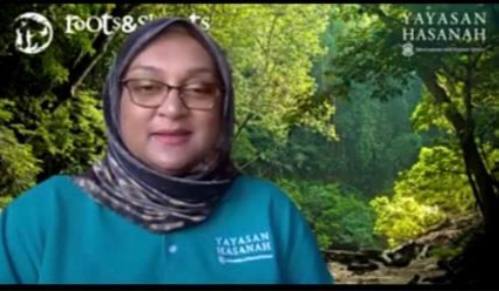
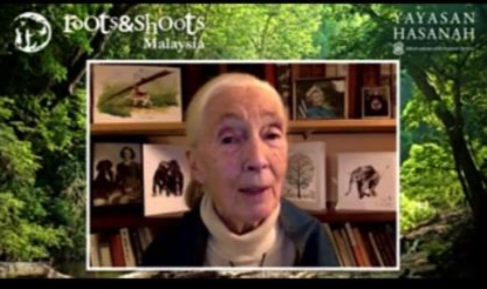
ILMU HASANAH : Linking Household income, health and well-being virtual live on 8 Dec 2020
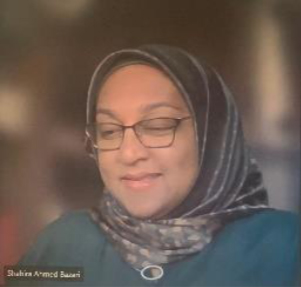
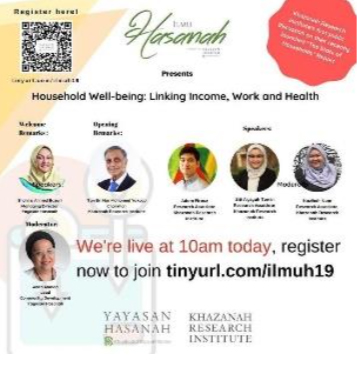

Copyright © 2021 Yayasan Hasanah
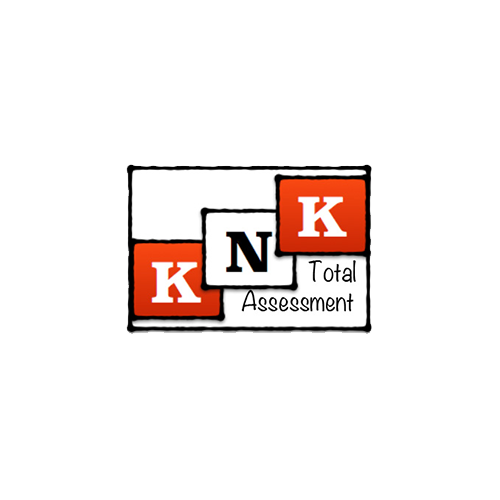
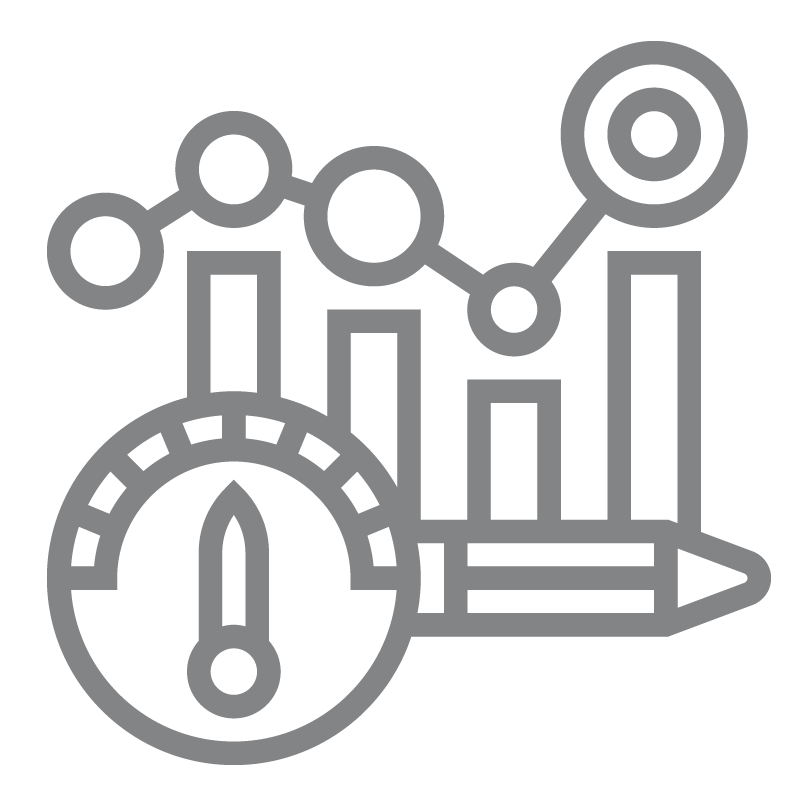
Completed field testing of indicators
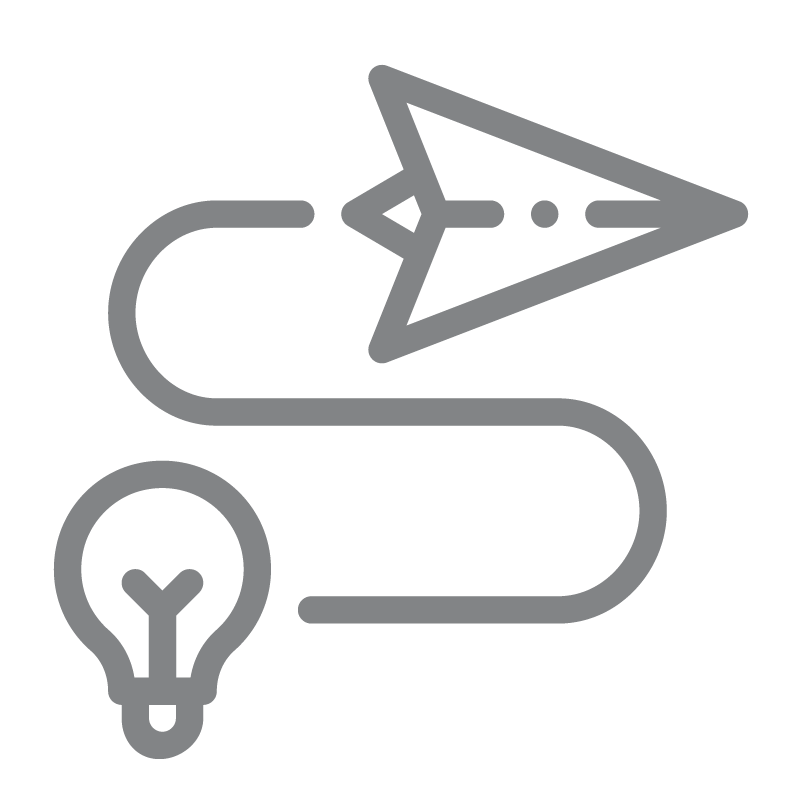
Developed communications plan
With the pilot rollout of the Alternate Assessment for Children with Learning Difficulties, (PASM – Pentaksiran Alternat Sekolah Menengah) expected in a dozen secondary schools nationwide in 2021, this year has been all about conceptualisation, design and realisation of instruments for that purpose. The partner is creating a tool to measure students’ abilities within their disabilities, an objective that traditional pen and paper examinations cannot satisfy.

Selected schools in Perlis were first introduced to embedded systems, coding, electronics, mobile apps, AI and various soft skills, after which students showcased their newly gained knowledge in innovation competitions with the ultimate goal of applying technology platforms to identify and solve real life problems in their community.

Economic devastation is possibly one of the most severe impacts of the COVID-19 pandemic, second only to medical-related ones. And for the beneficiaries of Pertubuhan Kesihatan dan Kebajikan Umum Malaysia (PKKUM) comprising of urban poor, jobless, B40, single mothers, senior citizens, the differently-abled and other marginalised communities around Chow Kit, this is a very real problem. So much so that for some, putting food on the table daily was a huge challenge.
In response to this, PKKUM Pusat Bantuan Khidmat Sosial (PBKS) commenced its Food for All street feeding project during the very first MCO. On top of providing daily meals, its second objective was to assist those from B40 communities and whose earnings had been affected by COVID-19.
In July, PKKUM received the Hasanah Special Grant enabling it to provide 330 packs of food—guaranteed nutritious and comes with clean drinking water— for 110 beneficiaries on a daily basis.
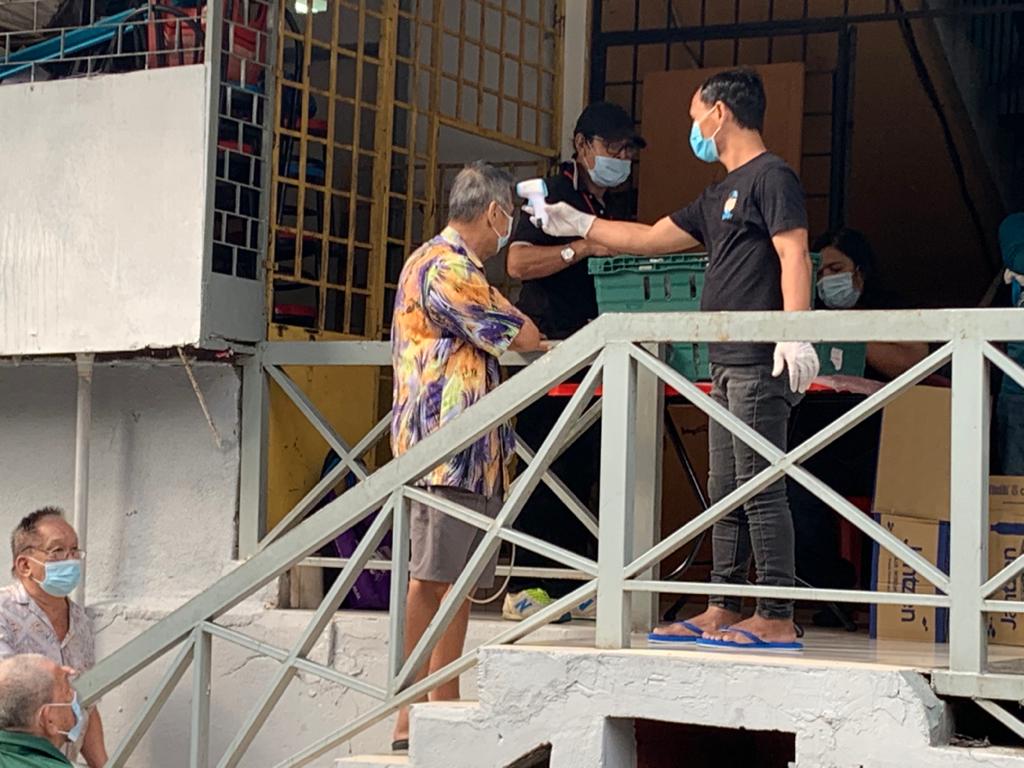
“We heard and understood the day-to-day struggles of our beneficiaries when they came reaching out to us. The Food for All project plays a vital role in providing sustenance to the less fortunate, serving as a lifeline for communities in need that would otherwise starve,” explains PKKUM programme manager Myra Hashim on what led to the birth of this initiative.
With HSG assistance also, the organisation was able to expand the types of capacity building classes it offered, which at that time, covered topics such as how to conduct an online business, business registration, marketing and accounting. The organisation’s PBKS Project 2020 saw 20 beneficiaries benefit from monthly workshops and classes on basic business knowledge and management. The aim was to expose them to and equip them with skills suited for new job opportunities.
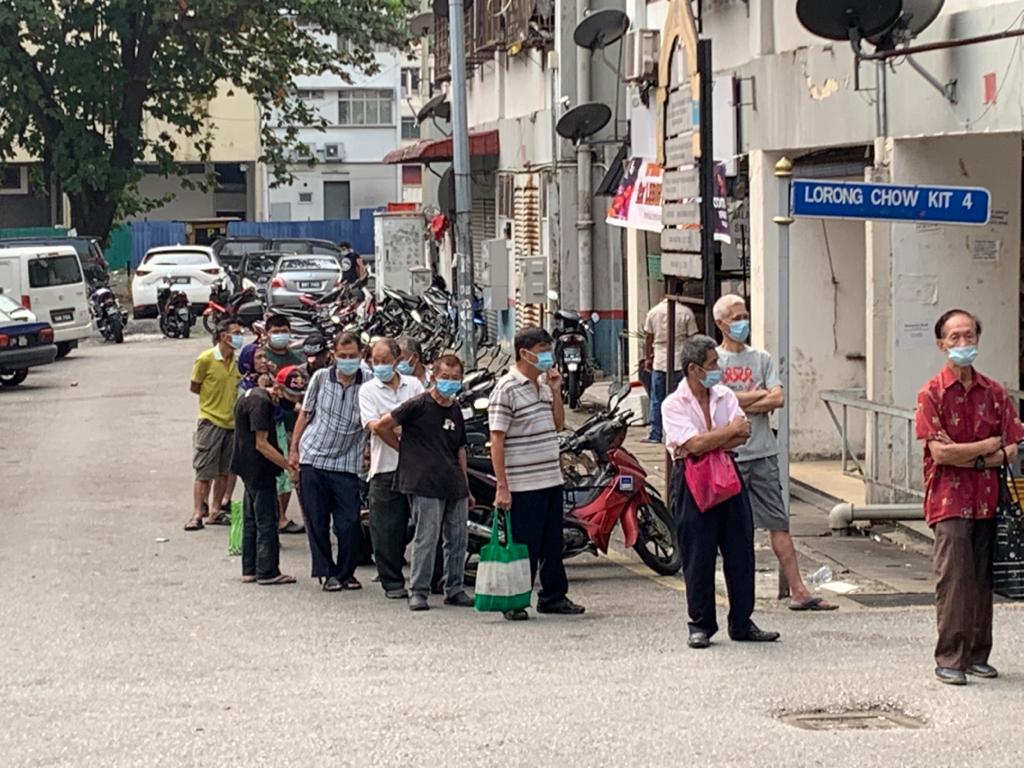
From an operations perspective, social distancing requirements have had a tremendous effect on the people-centric organisation that PKKUM is, limiting face-to-face interactions with its beneficiaries. But in time, everyday tasks were customised to comply with standard operating procedures and above all, keep everyone safe during a time when adapting is the only way forward.
One of our key learnings from 2020 was (discovering) the true social and financial impacts of the pandemic on the urban poor, jobless, B40 and other marginalised communities around Chow Kit.

A huge part of the Global Environment Centre’s (GEC) conservation efforts in the Upper Kinta River Basin (UKB) involves interacting with nearby communities and during the pandemic, they noticed an urgent need for alternative livelihood options. This led to an initiative to empower targeted Orang Asal and peri-urban communities living near the 25,000 hectare UKB—a crucial part of the Central Forest Spine and the primary watershed providing potable water to Ipoh.
Movement Control Orders posed a challenge to those who would typically venture out to sell their products while others employed by nearby quarries and development projects were adversely impacted when work was put on hold. Assistance from HSG was put to good use in response to this situation.
On key takeaways for the year, the GEC cites face-to-face meeting restrictions and lengthy feedback time of government agencies as hurdles that delayed implementation during already uncertain times.
“However, we quickly adapted to the situation and continued capacity building by conducting all meetings virtually, communicating via WhatsApp and mobilising local leaders to action. As many Orang Asal lack phone and internet access, an officer from the Department of Orang Asal Development facilitated communications during the early MCO phase,”
senior programme officer Sathis Venkitasamy explains.
Having overcome all that, the results speak for themselves. 35 families or 139 people in Kampung Makmur recorded increased income from the programme, an indication of GEC’s step in the right direction.
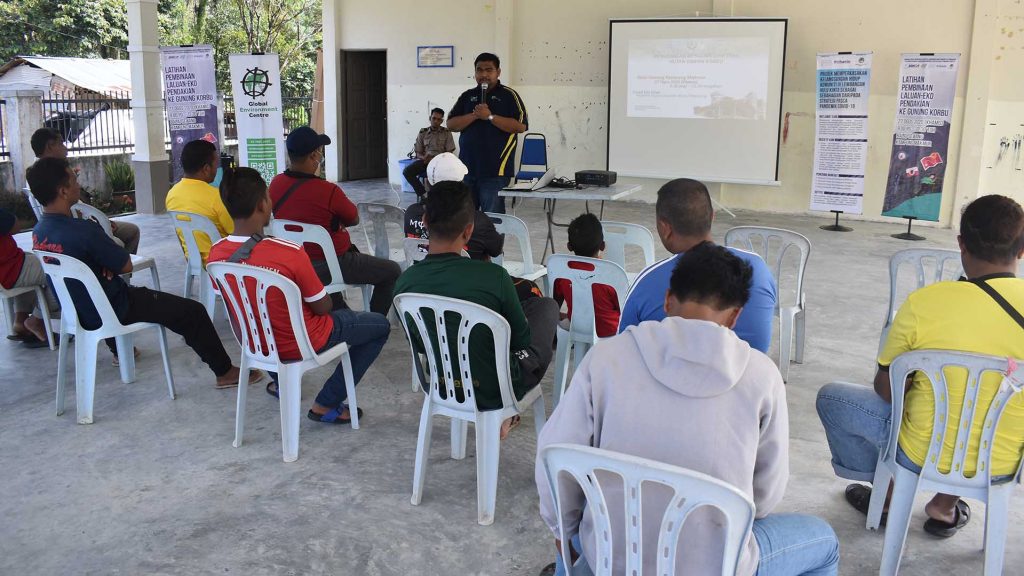
GEC felt that these identified communities would need additional support to empower it with new skills and enhance their livelihoods that were badly affected by the COVID-19 pandemic. (We find that) the nature of HSG’s post-COVID strategy to support and empower communities is in line with local needs.

When pandemic-driven movement restrictions orders were enforced, the Bornean Sun Bear Conservation Centre (BSBCC) was faced with a predicament. Its main source of income—ticketing sales—was lost.
Dr Wong Siew Te, the founder and Chief Executive Officer, explains that said revenue would normally go to cover husbandry cost for 43 rescued ex-captive sun bears that call it home, including an average of RM26,000 per month for their food.
The smallest of its kind and only found in Southeast Asia, the Malayan sun bears are unfortunately threatened by forest degradation, illegal hunting for body parts and poaching of their young for pet trade.
Owing to HSG, the rescue and rehabilitation centre in Sepilok, Sandakan was able to feed 40 bears and three cubs, without further depleting financial reserves that had been dipped into during challenging times.
Not only has the aid been helpful but also echoed the spirit of conservation as Dr Wong explains. “Besides, conservation is not the sole responsibility of the organisation,” he begins by saying. “Collaborations with the government and private agencies are essential to financial sustainability and growth of conservation efforts.”
Indeed, as we share this world with other living beings, we are all custodians in some regard, with organisations such as BSBCC leading the way. In 2008, the wildlife biologist, tropical forest ecologist and sun bear expert, who has been fascinated with animals all his life, founded BSBCC. Six years later, the large forest enclosures that provide a natural environment, facilitating their rehabilitation into the wild, opened its doors to visitors.
Though at the moment, BSBCC’s on-site visits may be temporarily replaced by virtual tours, the spirit and objectives of the centre—the only sun bear conservation facility in the world—is resounding as ever, as they tackle old problems threatening the lives of the species in new, no less challenging times.
Conservation is a continuous effort regardless of the global situation. BSBCC has learned that it has to be dynamic in generating other forms of revenue to cope with unprecedented financial constraint.

One afternoon, Ayu (not her real name) and her three children walked two hours in the scorching heat to the nearest police station. With only RM20 in her pocket, the beatings she endured the night before in the hands of her husband was the final straw. Searching online led her to being referred to the Women’s Centre for Change (WCC) and a social worker stayed in touch with her via phone right up to her lodging a police report, undergoing medical check-up and approved for interstate travel so that she and her children no longer had to be at the mercy of an abusive husband and father.
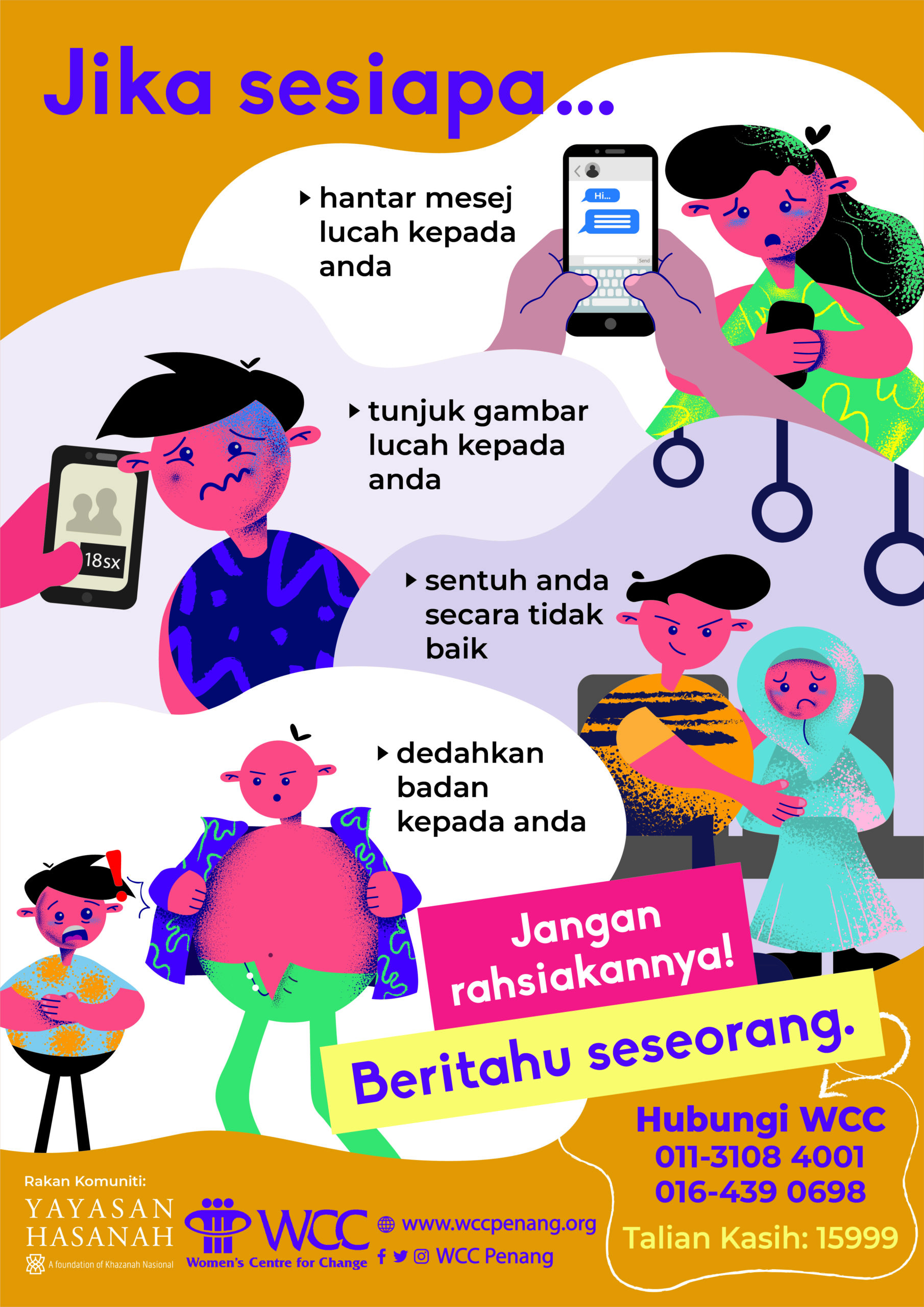
Unfortunately, this isn’t an isolated incident.
Between March and May 2020, the WCC saw a near doubling of child sexual abuse (CSA) cases. Instances of domestic violence (DV) recorded an alarming increase too, making up 80 out of the 238 new cases handled.
The World Health Organisation attributed an increased likelihood of physical, psychological and sexual abuse at home (particularly children already living in violent or dysfunctional family situations) to ‘movement restrictions, loss of income, isolation, overcrowding and high levels of stress and anxiety’.
While dealing with escalating instances of CSA and DV, social distancing meant cancelling WCC’s major 35th anniversary fundraiser and budget reviews alongside a steep learning curve of operating remotely, all at once. As an organisation dependent on public donations to sustain work, it was badly affected monetarily and HSG assistance couldn’t have come at a better time.
According to WCC Executive Director Loh Cheng Kooi, the funding was well-utilised for a wide range of efforts, namely providing critical counselling for women and children, launching two online storybooks (Lisa and her Secret and Yusri and his Secret) aimed at children and teachers, ten awareness-driven webinars and 40 e-posters in BM, English, Chinese and Tamil as well as capacitating staff in handling and advocating cases in line with the new norm that included working from home with extended hotline hours.
That said, the organisation has reinvented itself and emerged stronger. “In every crisis, lies an opportunity. HSG enabled us to transform our physical work seamlessly into the virtual world; and the results were resounding, way beyond our expectations,” says Loh summing up the key takeaway from 2020.
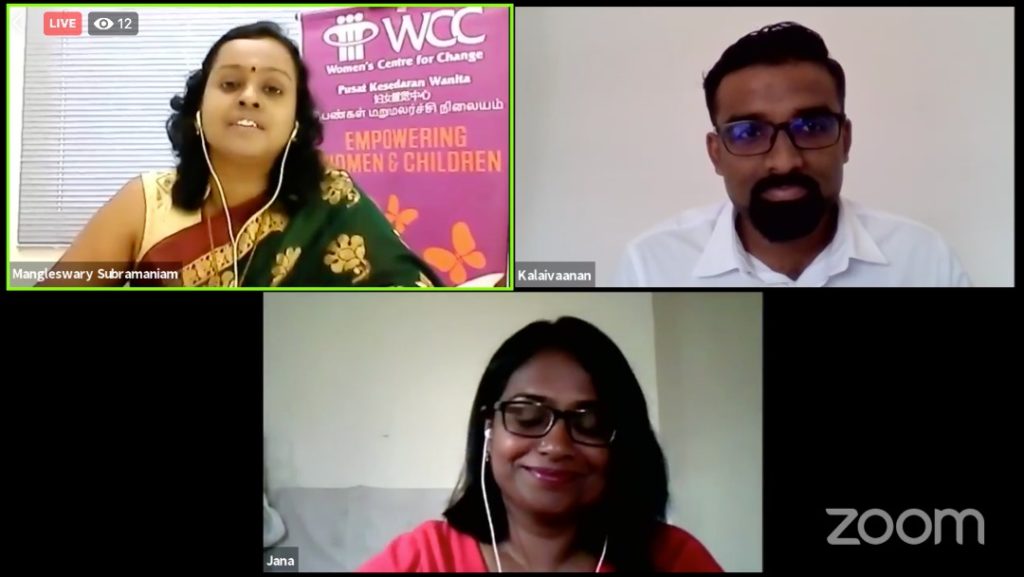
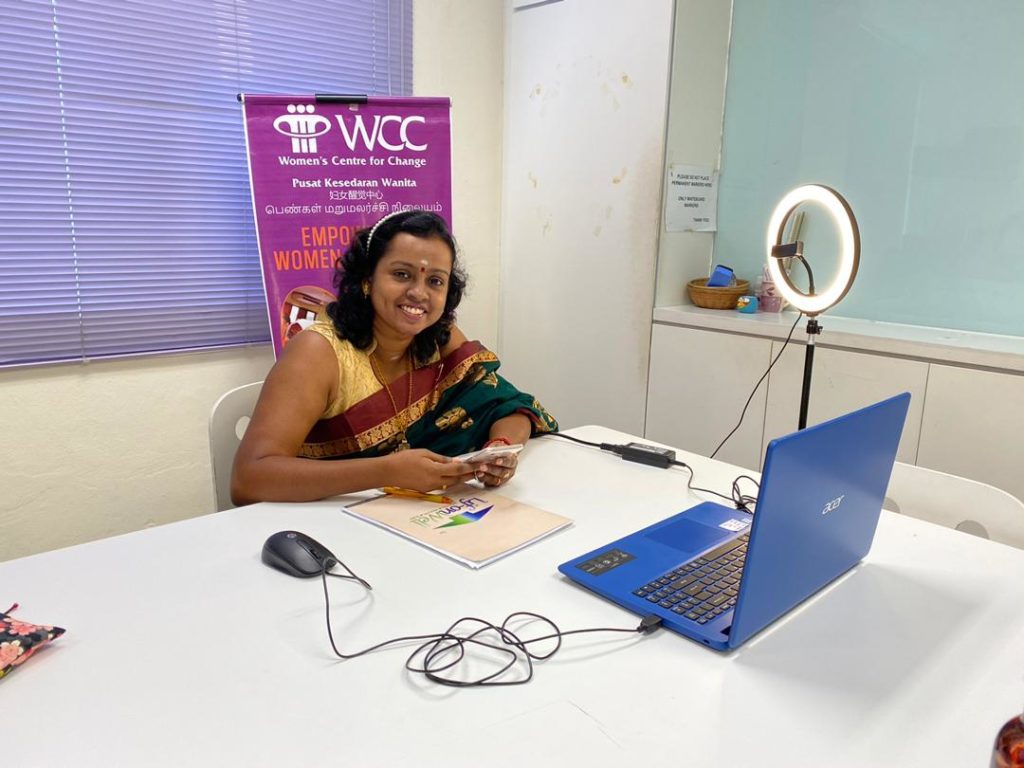
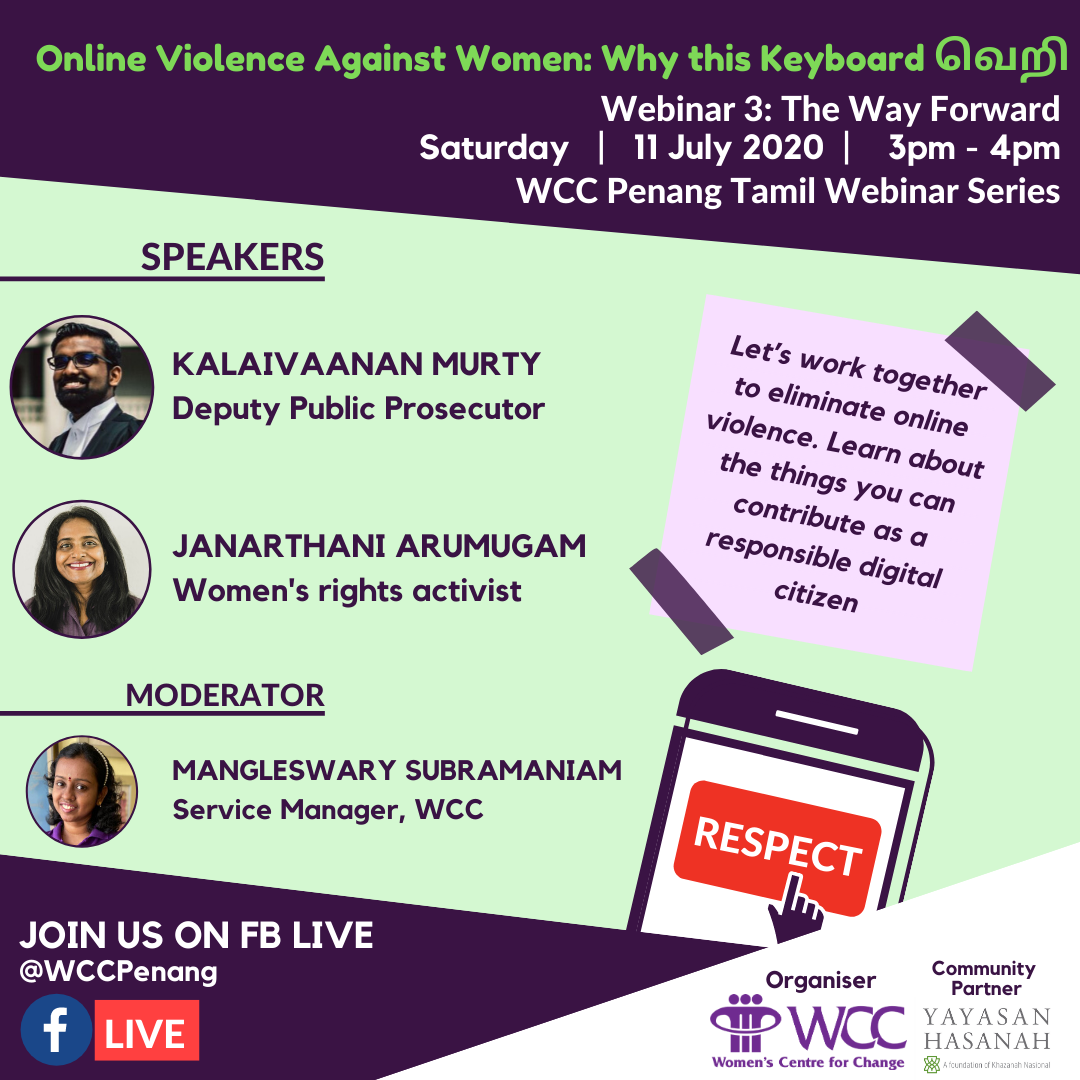
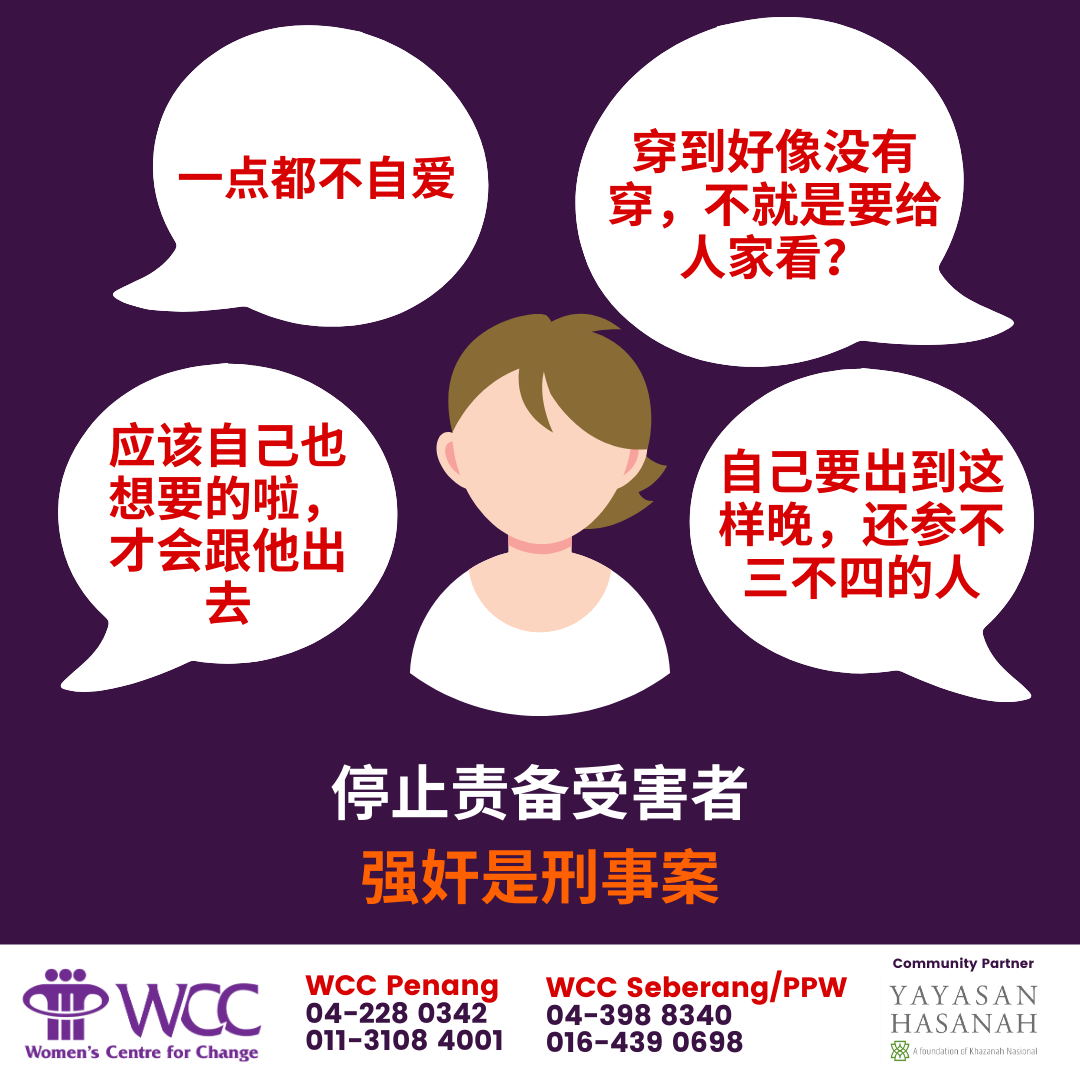

Our work is no longer limited to Northern states. Via social media platforms, WCC reached nearly one million people of various ethnicities nationwide from June to December 2020 alone. We also noted the complementary role of vernacular webinars— for example, we receive more calls from Tamil-speaking women after a Tamil session.

For 32 years, Kiwanis Down Syndrome Foundation National Centre (KDSF-NC) has provided its Early Intervention Programme for children with Down syndrome, from the age of two months to six years. It involves therapy, exercises and activities designed to address developmental delays. Students pay a heavily subsidised, minimal-fee and further deductions are available for those from low-income families.
When COVID-19 hit, the centre had to close and its 34 students could no longer benefit from the sessions. Teachers and therapists had to upskill almost as quickly as decisions were being made. Hence, the KDSF Re-adapted Early Intervention Programme was born.
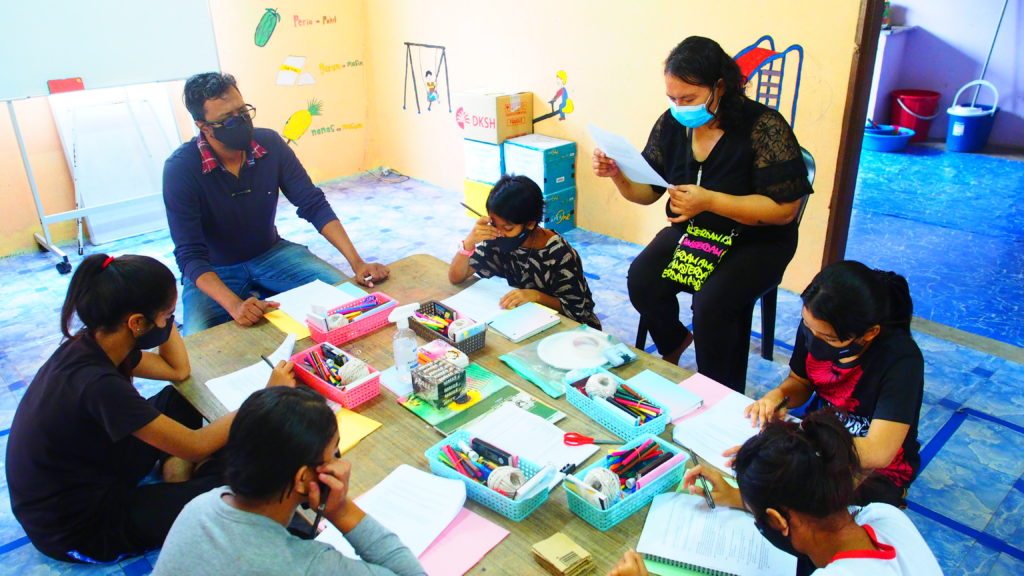
Concerning funding, public donations dwindled tremendously and all fundraising events came to a halt as most—such as the Annual Charity Funfair—involved large crowd attendance. Seeing that it depended solely on public donations to sustain operations and programmes, Heng says that HSG helped maintain the full teaching team, upgrade internet infrastructure and technology equipment.
“As a non-profit, we have always been prudent in our spending and preferred traditional teaching materials over investing in technology,”
KDSF–NC Executive Director Angie Heng explains, citing realising the importance of the latter as one of the organisations key learnings for 2020. Luckily, some of the teachers utilised their personal laptops, reducing the cost of procuring more devices.
Some other challenges were parents struggling to guide children through classes, giving up easily or lacking computer savviness. Teaching tools had to be improvised to suit what parents could find at home and therapists shouldered an additional role of guiding parents during activities.
“Some parents are receptive to this new way of education but do not have enough gadgets to utilise among their school-going children. It would usually be our students that have to give way to (for example) their older siblings who attend typical schools or require it for exams,” Heng observes.
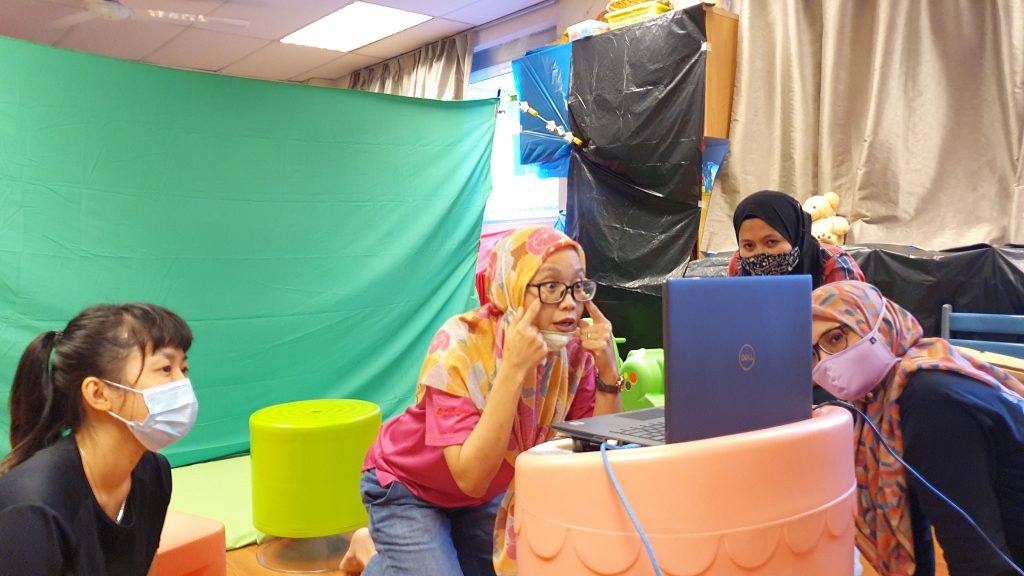
Besides insufficient gadgets and poor internet connection, having parents watch over their shoulders throughout lessons and being unable to access teaching resources at the centre during restricted movement orders were but some of the hurdles. This experience brought to light the need to pay attention to the mental health of the facilitators.
On the bright side, having to convert to e-learning revealed the possibility of reaching students outside urban areas, rendering it a year of learning and re-learning for the organisation and its students alike.
With assistance from HSG, we were able to waive fees for students whose parents had taken pay cuts or were out of jobs—students who otherwise would not be able to continue their education (with us)